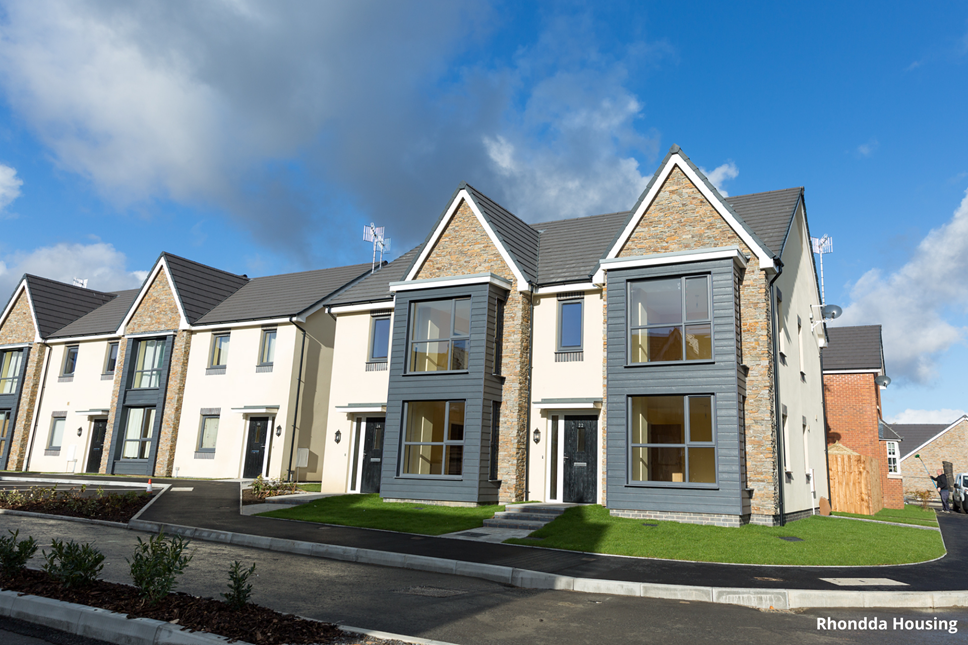
All new homes in Wales to be heated and powered from clean energy sources from 2025
Gwres ac ynni o ffynonellau ynni glân i bob cartref newydd yng Nghymru o 2025 ymlaen
Ambitious new proposals which would lead to all new homes in Wales being heated and powered only from clean energy sources from 2025, making them more energy efficient and cheaper to run, have been set out by the Welsh Government.
The consultation proposals unveiled by Housing Minister, Julie James, are part of wider Welsh Government plans to address the climate emergency it declared last year.
Later this year, Ministers will bring forward legislation to adopt a 95% greenhouse gas reduction target, with an ambition to reach net zero in future.
Housing contributes significantly to climate change: new and existing homes currently account for 9% of Welsh greenhouse gas emissions.
If Wales is to meet its climate targets, buildings will need to operate at close to zero emissions by 2050. This will require a substantial change in how buildings are heated and powered in future. The amount of energy used in buildings will have to be significantly lower, while the remaining energy demand will need to be delivered through low carbon and renewable sources.
To address this, the Welsh Government is proposing the introduction of tough new standards on new homes, to be implemented in stages over the next five years.
The proposals include:
- Improved energy efficiency from 2020 which will lead to a 37% reduction in CO2 from new dwellings, compared with current standards, and save homeowners £180 a year on energy bills (based on a semi-detached home). In addition, all new homes will need to be future-proofed, to make it easier to retrofit low carbon heating systems;
- Phasing out the use of high-carbon fossil fuels and moving to cleaner ways to heat our homes though the introduction of low carbon heating and energy generation, such as renewable energy sources (photovoltaic panels), heat pumps or district heat networks, which involve heating and hot water to multiple buildings from a central heat source;
- Improving energy efficiency thorough introducing measures that limit heat loss and reduce the demand for heat, such as triple glazing and higher standard fabrics for walls, roofs, floors, and windows;
- Improving air quality by ensuring the supply and removal of air to and from a space or spaces in a building provides good air quality. This will also help ensure people's physical well-being is maximised.
When the new building standards are implemented in full in 2025, homes should produce 75-80% less CO2 emissions than ones built to current requirements.
Housing Minister, Julie James said:
“New and existing housing contribute about a fifth of the UK’s greenhouse gas emissions. If we are to meet our ambitious target of reducing our greenhouse gas emissions by 95% by 2050, we need to take action now to make a significant step change to the way we heat and power our homes.
“The new homes being built today will exist in 2050. Therefore, we must ensure the standards we set for these homes put us on the right path. This involves improving energy efficiency and moving to cleaner ways to heat our homes.
“The proposed consultation, for implementation over the next five years, makes a strong and meaningful contribution to reducing the carbon and energy impact of new homes, while recognising our ambition needs to be balanced against the desire for standards to be cost-effective, affordable and practical.
“These measures will not only help tackle climate change, but they will also help keep down household energy costs now and in the future - helping people, no matter what their background or circumstances, with the cost of living.”
The consultation on the new proposals closes on the 12 March 2020.
The Welsh Government intends to consult separately on standards when building work is carried out in existing dwellings, and new and existing non-domestic buildings, with a view to uplifting the standards.
